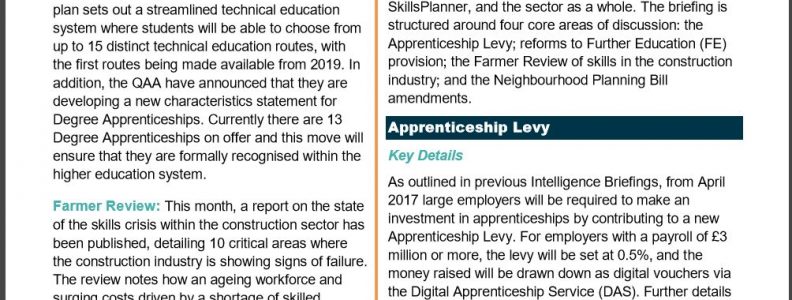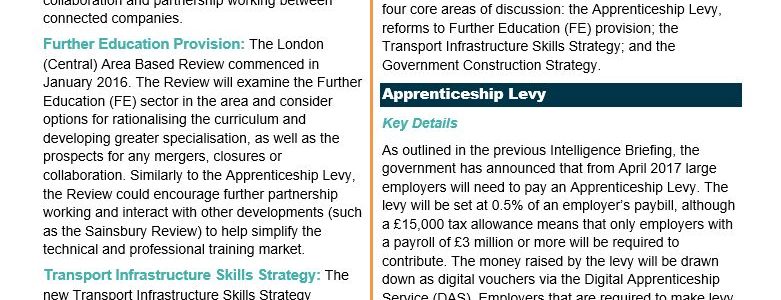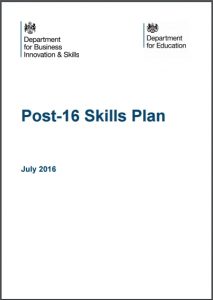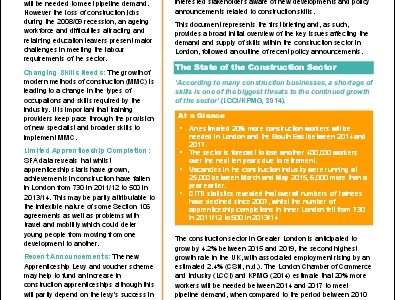Keeping SkillsPlanner stakeholders updated on key developments, Plymouth University’s SERIO applied research unit is producing a series of intelligence briefings covering construction skills in industry and government. SERIO’s third briefing (PDF – will open in new tab) is now available in our media section, along with the first (published in February 2016 – post) and second (July 2016 – post).
Written in clear, non-academic English, these briefings are intended to inform and engage our audiences with our ongoing R&D project. The latest looks at four topics:
Apprenticeship Levy: In August 2016 the government released further details concerning the specifics of the Apprenticeship Levy. This includes a 90% apprenticeship training co-investment from government for non-levy paying businesses; and the introduction of 15 funding bands that will cap the maximum price government will co-invest towards the cost of each apprenticeship.
Further Education Provision: The findings from a panel chaired by Lord Sainsbury into the ‘over-complex’ technical and professional qualification environment have been released, alongside a series of recommendations which have been accepted by the government. The Post-16 skills plan sets out a streamlined technical education system where students will be able to choose from up to 15 distinct technical education routes, with the first routes being made available from 2019. In addition, the QAA have announced that they are developing a new characteristics statement for Degree Apprenticeships. Currently there are 13 Degree Apprenticeships on offer and this move will ensure that they are formally recognised within the higher education system.
Farmer Review: This month, a report on the state of the skills crisis within the construction sector has been published, detailing 10 critical areas where the construction industry is showing signs of failure. The review notes how an ageing workforce and surging costs driven by a shortage of skilled workers have stalled investment. Among the recommendations set out in the report, several refer to the need for skills and training to better reflect the needs of a future modernised industry, including the use of OpenData to address the construction skills gap, specifically mentioning SkillsPlanner (read our blog post).
Neighbourhood Planning Bill: A series of new amendments have been made to the Neighbourhood Planning Bill which are now due to be considered by a Public Bill Committee. The Bill seeks to simplify how plans can be revised as local circumstances change and measures will support more housebuilding and provide more local say over developments.



 Further Education Provision: The London (Central) Area Based Review commenced in January 2016. The Review will examine the Further Education (FE) sector in the area and consider options for rationalising the curriculum and developing greater specialisation, as well as the prospects for any mergers, closures or collaboration. Similarly to the Apprenticeship Levy, the Review could encourage further partnership working and interact with other developments (such as the Sainsbury Review –
Further Education Provision: The London (Central) Area Based Review commenced in January 2016. The Review will examine the Further Education (FE) sector in the area and consider options for rationalising the curriculum and developing greater specialisation, as well as the prospects for any mergers, closures or collaboration. Similarly to the Apprenticeship Levy, the Review could encourage further partnership working and interact with other developments (such as the Sainsbury Review – 
 Perhaps inevitably, given the volatility of the industry, almost as soon as we published the briefing, one of these sources was updated. Today, we’ve been browsing through
Perhaps inevitably, given the volatility of the industry, almost as soon as we published the briefing, one of these sources was updated. Today, we’ve been browsing through 
